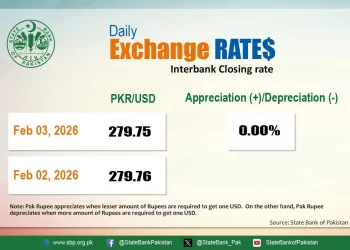HONG KONG: Markets mostly rose Friday after a largely negative day on Wall Street despite growing confidence of a US interest rate cut, while the yen saw big swings as speculation swirled that Japan had stepped into forex markets to support the currency.
A smaller-than-expected read on the June consumer price index ramped up bets on the Federal Reserve lowering borrowing costs in September, and possibly again before January.
The news came after the central bank’s boss Jerome Powell said decision-makers would not wait until inflation had hit the bank’s two percent target before loosening monetary policy, warning that “if you waited that long, you’ve probably waited too long”.
On Thursday, San Francisco Fed chief Mary Daly said: “I do think with the incoming information on inflation, growth and the labour market, some policy adjustments are likely to be warranted.”
However, while the figures appeared to give the all-clear for a cut in two months, the S&P 500 and Nasdaq tumbled from record highs, with observers blaming a shift from big-name tech titans such as Amazon and into smaller, largely overlooked stocks.
But most of Asia extended Thursday’s rally.
Hong Kong climbed more than two percent, while there were also advances in Singapore, Sydney, Wellington, Mumbai, Bangkok, Jakarta and Manila. London, Paris and Frankfurt all opened higher.
However, Tokyo sank with Seoul and Taipei. Shanghai was flat.
Stocks stride to record highs ahead of US inflation test
Analysts, meanwhile, said the softer US inflation print provided Japanese authorities the perfect opportunity to step into forex markets to provide support to the yen, which surged against the dollar Thursday.
The Japanese currency spiked from around 161.50 per dollar to as strong as 157.44, fuelling talk that officials had intervened again, having done so in April when the yen hit a 38-year low.
“The pronounced move in the yen appears to be coming on the back of combined impact from US inflation and intervention by Japanese authorities,” Charu Chanana, at Saxo Markets, told AFP.
“There seems to be a new playbook for Japanese interventions, coming in along with supportive fundamentals, making the strength in yen somewhat more durable.”








